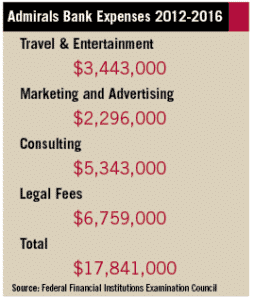Even before federal regulators got involved, it was no secret that Admirals Bank was struggling.
The bank has not turned a profit since 2013 and it was the only bank in Massachusetts in 2016 to lose money.
But while its outlook worsened, the bank racked up millions in expenses on legal fees, consulting, marketing and advertising and entertainment and travel.
“They seemed to spend money on lavish things,” a former Admirals Bank employee, who wished to remain anonymous, told Banker & Tradesman. “The owners were retired, and it felt like they started the bank with the intention of having a source of entertainment. We all joked around that they were bored and wanted to start a bank, so Admirals came out of that.”
According to a review of call reports by Banker & Tradesman, the now $328-million asset bank spent $17.8 million combined on legal fees, consulting, marketing and advertising and entertainment and travel between 2012 and 2016.
In comparison, none of the top five banks in Massachusetts under $700 million in assets or under $500 million in assets spent more on legal fees, consulting and entertainment and travel during that time frame than Admirals Bank, which had nearly $650 million in assets in 2012.
The only category it came in second in was marketing and advertising, where the bank still spent close to $3 million during those years, according to the review by Banker & Tradesman.
Regulators Take Notice
“There, operating expenses are a really big problem for them,” said Suzanne Moot, a Milton-based banking analyst.
Moot wasn’t the only one to notice.
The Office of The Comptroller of the Currency slapped a cease-and-desist order on the bank in March, hinting at concerns with the bank’s spending habits.
The consent order, which is still in effect, required the bank to adopt an “independent, internal audit program” of bank-paid expenses including bank-issued credit cards, entertainment and travel expenses of insiders, telephones or electronic devices, cars, legal fees, prepaid assets, insider reimbursements and insider expense-related accounts.
The enforcement action also required the bank to “engage an independent party” to audit senior management expenses between the years 2014 and 2016.
The expenses the OCC requested for audit included entertainment and events, office and facility renovations, aviation, automobile and other transportation expenses, lodging and meals and trips and charges to corporate credit cards.
The OCC order also wanted Admirals Bank to “ensure effective management and adequate staffing.”
Following the breakdown of a deal earlier this year that would have seen a group of banking executives purchase a large amount of assets from Admirals and spin off into a new bank, the Boston Business Journal reported that former Admirals Bank CEO Nicholas Lazares had been removed from that post.
His name and picture have since been removed from the bank’s website page that lists the bank’s executive leadership team.
Multiple calls to Admirals Bank General Counsel Dimitri Nionakis were not returned. Susan Dufresne, a manager and director of the holding company of Admirals Bank, could not be reached for comment.
What Was The Money Spent On?
The former Admirals employee, who wished to remain anonymous, said the office that Admirals moved into at 200 Clarendon St. in Boston certainly seemed a bit excessive.
“The owner (Lazares) was super into sailing, hence the name Admirals Bank,” he said. “He spent a lot on lavish sailing decorations. It was a beautiful office.”
Moot said the high legal fees could be partly attributed to the bank’s non-traditional business model – past or present.
In its early days, Admirals grew by purchasing large volumes of commercial loans on the secondary market for a discount, not your typical community bank model.
In recent years, the bank has shifted away from this model.
Admirals launched a solar financing arm called the FastTrack program that is aimed at small- to medium-sized businesses, with a business development office in San Francisco, and moved into the home improvement lending business.
But it is also clear that the bank has been dealing with litigation.
A group of eight former loan officers and sales people at Admirals Bank filed a class action lawsuit against the bank and former vice president Lee Pollock in U.S. District Court of Boston, alleging they were promised higher salaries than they received.
The group, which is seeking $700,000 in damages, filed the case in federal court last month, but the case appears to have been going on for the last few years, as several of the plaintiff’s official testimony is dated in 2015.
The eight employees are alleging they were wooed away from their jobs or took jobs at Admirals because of the salaries they were promised, which never materialized.
Company executives “intentionally misrepresented the projected compensation” to the eight former employees, the lawsuit alleges, leading the group to fall short of their salary expectations. Many of the recruited loan officers or salespeople were eventually laid off or quit, according to the lawsuit.
Ronald Urnetta, one former employee involved the lawsuit, said in testimony that some of the loan advisors were promised an annual salary of $100,000, yet never got close.
“The most experienced, successful loan advisor resigned stating that after exceeding all of his expected goals and following the bank’s model he would be lucky to earn $50,000 for the year and couldn’t afford to work there,” he wrote.
An Uncertain Future
It remains to be seen if Admirals can forge a path forward after a tough start to the year.
Through the first six months of 2017, the bank reported more than $15 million in losses, slashed 47 employees from its work force and terminated the FastTrack Program.
 To cover those losses, Admirals has been eating through its deteriorating capital.
To cover those losses, Admirals has been eating through its deteriorating capital.
Its tier 1 leverage ratio, the relationship between a bank’s core capital and core assets, was at 8.9 percent at the end of June, slightly below the 9 percent the OCC had required Admirals to stay above in its enforcement action.
Also, while the bank reported zero dollars for expenses in marketing, consulting or travel and entertainment thus far in 2017, Admirals has already amassed more than $3.7 million in legal fees in the first six months of the year.
The assets of the bank that former CEO Lazares had planned to keep and start a new business with when the deal to sell most of the bank’s assets was still in motion also have issues.
The FastTrack solar program was terminated and testimony from Robert Nash, one of the former loan advisors named in the lawsuit, suggests the home improvement lending business may not be so great either if it is anything like it was a few years ago.
“The Title 1 product that the bank was offering was simply an ill-advised deal, and that any person in need of a loan could easily look anywhere else for better terms,” he wrote. “It became exceedingly difficult to close a loan, mainly due to the bank’s lack of organization in the underwriting department.”




 |
| 


